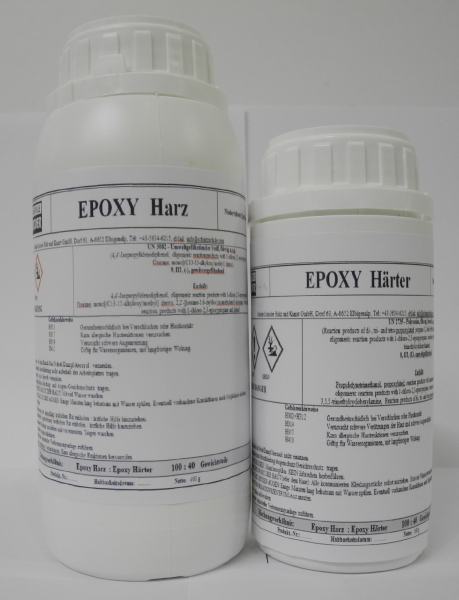Epoxy - resin systems 560 gr.

- Order number: 751122005.10
Epinal UR 36.40 / UH 36.40 Very good UV-resistant epoxy resin system
UR 36.40 / UH 36.40 is a very lightfast, transparent epoxy resin system for many casting applications. Due to the reduced reactivity of the system, layers up to 5 cm thick can be poured in one operation (material & room temperature max. 23 ° C). Even at a curing temperature of 40 ° C, layer thicknesses of 2 cm can be produced without any problems. Epinal UR 36.40 / UH 36.40 is also excellently suited as a low-viscosity impregnation system with a very long pot life (e.g. wood consolidation). It has excellent adhesion properties on various fabrics, foams, wood and mineral materials. Mineral fillers as well as light fillers can easily be added if necessary. Depending on the type of filler, this can extend or shorten the pot life, processing time and also the curing time. Translucent to opaque coloring without impairing the surface hardness is possible with Epinal Color Cream UR. Appropriate application tests with regard to the intended casting project are recommended. Product specifics transparent 2K epoxy system very long pot life, low viscosity solvent-free, phenol-free, free from benzyl alcohol very good wetting properties 5 cm layer thickness per grout (at max. 23 ° C MT & RT) possible, 2 cm per grout up to + 40 ° C curing temperature very good self-venting properties minimized hardening shrinkage due to low exothermic temperature development good chemical resistance and mechanical properties application areas Potting in thick layers Infusion & vacuum processes impregnate hand lamination
Properties resin / hardener UR 36.40 (Resin) UH 36.40 (Harder) notes Density [g / cm³] 1.098-1.118 0.965-0.985 20 ° C Viscosity [mPas] 450 - 950 50 - 110 25 ° C Color transparent transparent Storage [° C] +20 to + 25 ° C Mixing ratio UR 36.40 (Resin) UH 36.40 (Harder) notes Mixing ratio 100 40 by weight 100 ml 45 ml by volume at 20 ° C Mixed viscosity [mPas] 100 - 500 25 ° C The specified mixing ratio must be adhered to as precisely as possible. Deviations cause an unbalanced curing process with possibly poor results. consumption Cast resin system approx. 1.10 - 1.15 kg / L volume approx. 1.10 - 1.15 kg per m² with a 1 mm layer thickness processing Epinal UR 36.40 / UH 36.40 Notes Material & object temperature [° C] +20 to +23 Ambient temperature [° C] +20 to +23 Substrate temperature [° C] +20 to +23 rel. Humidity [%] <85 Room, material and / or object temperatures higher than 23 ° C can lead to heat tinting (yellowing) and / or blistering due to overheating during the curing process. A corresponding reduction in layer thickness per casting process is required. processing Epinal UR 36.40 / UH 36.40 Note Pot life (amount 100 g / 23 ° C) [h]> 7 material temperature 23 ° C Deaeration phase in the mixing vessel Mixture amount 1 kg / 24 ° C [minutes] 30 - 45 larger amounts, higher liquid level or higher temperatures cause a shortening of the pot life and must therefore be poured earlier or the amount used must be reduced Casting 540 g, Ø 12 cm, 50 mm h gels after Maximum exotherm 17 hours ~ 40 ° C after 19 hours starting temperature 23 ° C Touch-proof after [h] ~ 24 h / 50 mm layer thickness at 23 ° C Can be poured over after [h] ~ 48 h / 50 mm layer thickness at 23 ° C curing temperature Processing window ** max. 3 days at 23 ° C mechanically workable after [days] 4 - 5 at 23 ° C curing temperature Thermally loadable up to [° C] ~ 45 ° C after curing 25 ° C / 30 days Surface hardness (Glass = 100) [Shore D; ± 2] casting 60 x 60 x 50 mm h viscous, soft after 1 day / 23 ° C 35 (rubbery) after 2 days / 23 ° C 46 after 3 days / 23 ° C 68 after 4 days / 23 ° C 70 after 5 days / 23 ° C 74 after 6 days / 23 ° C 75 after 7 days / 23 ° C 78 after 14 days / 23 ° C Lower layer thicknesses and / or lower curing temperatures require longer curing times and slower increase in surface hardness The values given are average results and may vary depending on the type of processing and curing conditions. It is essential to protect surfaces from moisture (dew, condensation), dust, etc. during the curing time. ** Surfaces that have cured for a longer period of time must be sanded to ensure optimum adhesion properties. Packaging / delivery (container pairs) Epinal UR 36.40 3 x 5 kg 2 x 5 kg 1 x 5 kg 1 x 2.50 kg 1 x 800 g Epinal UH 36.40 3 x 2 kg 2 x 2 kg 1 x 2 kg 1 x 1 kg 1 x 320 g Large containers on request
Epinal UR 36.40 / UH 36.40
Sehr gut UV-beständiges Epoxy Gießharzsystem
UR 36.40 / UH 36.40 ist ein sehr gut lichtbeständiges, transparentes Epoxyharzsystem für viele Gießanwendungen.
Durch die reduzierte Reaktionsfreudigkeit des Systems können Schichtstärken bis zu 5 cm in einem Arbeitsgang gegossen werden (Material- & Raumtemperatur max. 23°C).
Selbst bei einer Härtungstemperatur von 40°C sind Schichtstärken von 2 cm problemlos herzustellen.
Epinal UR 36.40 / UH 36.40ist auch als niederviskoses Imprägniersystem mit sehr langer Topfzeit hervorragend geeignet (z. B. Holzverfestigung). Es besitzt ausgezeichnete Haftungseigenschaften auf diversen Geweben, Schaumstoffen, Holz und mineralischen Werkstoffen.
Mineralische Füllstoffe sowie auch Leichtfüllstoffe können bei Bedarf problemlos bei-gemengt werden. Je nach Füllstoffart kann sich dadurch die Topfzeit, Verarbeitungszeit und auch die Härtungszeit verlängern bzw. verkürzen.
Transluzente bis deckende Einfärbung ohne Beeinträchtigung der Oberflächenhärte ist mittels Epinal Color Cream UR möglich.
Entsprechende Anwendungstests hinsichtlich des beabsichtigten Gießvorhabens werden empfohlen.
Produktspezifika
![]() transparentes 2K-Epoxysystem
transparentes 2K-Epoxysystem
![]() sehr lange Topfzeit, niedrige Viskosität
sehr lange Topfzeit, niedrige Viskosität
![]() lösungsmittelfrei, phenolfrei, frei von Benzylalkohol
lösungsmittelfrei, phenolfrei, frei von Benzylalkohol
![]() sehr gute Benetzungseigenschaften
sehr gute Benetzungseigenschaften
![]() 5 cm Schichtstärke pro Verguss (bei max. 23°C MT & RT) möglich,
5 cm Schichtstärke pro Verguss (bei max. 23°C MT & RT) möglich,
2 cm pro Verguss bis +40°C Härtungstemperatur
![]() sehr gute Selbstentlüftungseigenschaften
sehr gute Selbstentlüftungseigenschaften
![]() minimierter Härtungsschrumpf durch geringe exotherme Temperaturentwicklung
minimierter Härtungsschrumpf durch geringe exotherme Temperaturentwicklung
![]() gute chemische Resistenzen und mechanische Eigenschaften
gute chemische Resistenzen und mechanische Eigenschaften
Anwendungsgebiete
![]() Vergießen in hohen Schichtstärken
Vergießen in hohen Schichtstärken
![]() Infusions- & Vakuumverfahren
Infusions- & Vakuumverfahren
![]() imprägnieren
imprägnieren
![]() handlaminieren
handlaminieren
 DE
DE EN
EN








